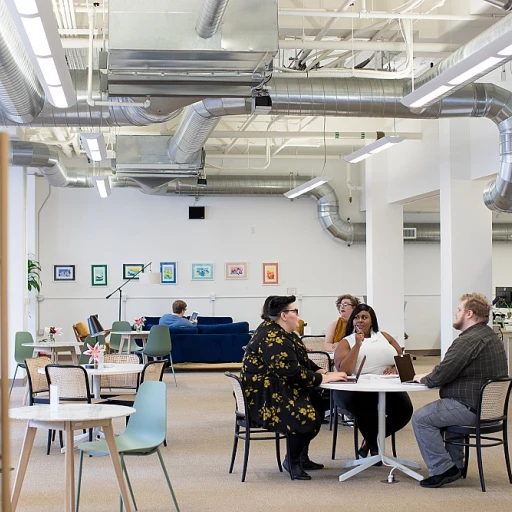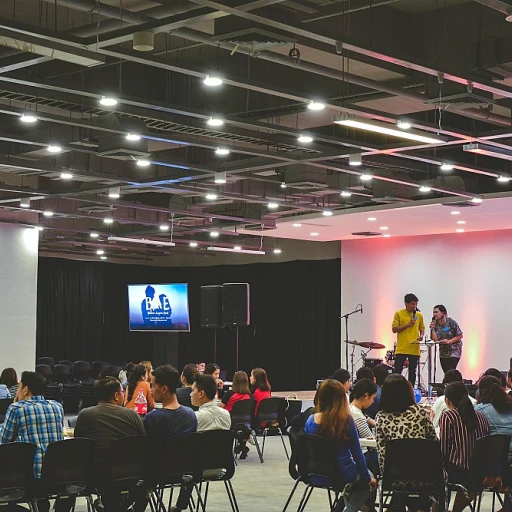
Overview of Addnum's Remote Work Framework
Foundational Groundwork of Addnum's Telework Structure
Addnum has embraced the evolving landscape of remote work with a well-defined policy framework designed to support a range of work arrangements, ensuring that both teleworking employees and supervisors remain aligned with organizational goals. This framework is not only about transitioning from the regular worksite to an alternate worksite but also about integrating effective communication and collaboration strategies, as further elaborated in subsequent sections.
The work policy employed by Addnum highlights flexibility without sacrificing performance. Employees working remotely are expected to maintain a level of professionalism and accountability akin to those working in a traditional office setting. The policy clearly outlines the responsibilities for each individual, from the supervisor to the remote worker, enforcing a structure that supports both employee performance and organizational success.
An employee supervisor plays a crucial role in the implementation and ongoing management of remote work arrangements. They are tasked with setting clear objectives, monitoring progress, and ensuring that the work schedule is adhered to. Meanwhile, human resources provides telework training to ensure all team members understand remote work protocols and are equipped for success.
Another critical component of Addnum's framework is the adherence to workers compensation guidelines, ensuring safety and well-being even when away from the traditional office. The policy delineates between approved remote work locations, known as the duty station, and other alternate work setups, ensuring accountability and a seamless work experience.
Discover more on how a supportive remote work culture thrives with Addnum's policy, ensuring the company culture remains intact despite geographical disparities.
Communication and Collaboration Strategies
Fostering Effective Communication
Addnum recognizes that successful remote work relies heavily on effective communication. The organization has established clear channels to facilitate communication between remote workers and their teams. This ensures timely exchange of information, essential for maintaining productivity and morale. Employees are encouraged to use approved communication tools and applications for real-time messaging, video conferencing, and project management. Regular check-ins with supervisors help in aligning on goals and expectations, essential given the varying work locations and time zones of employees.Collaboration Beyond Boundaries
Collaboration in a remote setting can be challenging, but Addnum has crafted policies that bridge geographical distances. The goals are fostering a culture of teamwork and reducing feelings of isolation among teleworkers. These strategies include scheduled group meetings, virtual workshops, and telework training sessions to simulate an in-office environment. Employees are also encouraged to share feedback with human resources on these gatherings, ensuring continuous improvement in how teams work together from diverse locations.Empowering Through Clear Guidelines
Remote work policies at Addnum emphasize clarity and structure, helping employees navigate their responsibilities with confidence. Each remote work arrangement is tailored through a detailed work agreement, accommodating the unique dynamics of the employee's duty station and work jurisdiction. Supervisors play a pivotal role in this arrangement, guiding remote workers and ensuring that performance issues are addressed promptly. By clearly defining expectations and offering ongoing support, Addnum assists employees in achieving a balance between flexibility and accountability. For more insights into the dynamic comparison of remote work and traditional office work, you can explore "The Great Debate: Remote Work vs Office Work" to understand the intricacies further here.Technology and Tools for Remote Work
Equipping the Remote Workforce with the Right Tools
In the dynamic landscape of remote work, the efficacy of technology and the deployed tools becomes a linchpin for success. As organizations, like Addnum, pivot towards a flexible work arrangement, robust infrastructure for seamless communication and collaboration is essential. The right tools not only support the telework framework but also enhance overall employee performance and engagement.
To ensure all remote workers can fully integrate with the company’s workflow, a comprehensive remote work policy is implemented. This policy encompasses approved technology and resources crucial for service employees. From video conferencing software that replicates an office meeting environment to project management platforms that streamline multi-departmental tasks, the right tools can transform a duty station into a productive workspace.
Fostering Connectedness Through Communication Platforms
For any remote worker, maintaining a clear line of communication with the supervisor and team members is key. Video conferencing tools, chat applications, and collaborative software are vital in bridging the gap created by physical distance. Telework training further equips employees with the capability to utilize these technologies effectively, ensuring efficient communication across diverse work locations.
When evaluating the success of such approaches, accountability and performance measurement become relevant. These technologies provide supervisors with the ability to assess work outcomes, irrespective of the employee's location, creating a responsive and responsible work culture.
Seamless Integration with Secure Access
Another pivotal element in remote work arrangements is secure access to company resources. With a stable internet connection, remote workers can connect to the company’s secure network, safeguarding data privacy and compliance. This secure access facilitates a smooth transition from traditional office spaces to alternate worksites, redefining the concept of the regular worksite.
Effective technology and tool adoption are not standalone initiatives but rather integral facets of an organization’s overarching teleworking strategy. As businesses continue to explore opportunities within the digital workspace, they pave the way for future innovations and growth. You might find more insights on exploring opportunities in customer success remote jobs, which can provide a broader perspective on how different roles are adapting to this shift.
Employee Support and Well-being
Supporting Employee Well-being in a Remote Setting
Ensuring the well-being of employees is a cornerstone of Addnum's remote work policy. As remote work becomes more prevalent, it's crucial to provide comprehensive support that addresses both the professional and personal needs of remote workers. This involves a multifaceted approach, focusing on mental health, physical health, and work-life balance.
One of the key strategies is offering flexible work arrangements. By allowing employees to tailor their work schedules, Addnum recognizes the diverse needs of its workforce. This flexibility helps in accommodating various time zones and personal commitments, fostering a healthier work-life balance.
Comprehensive Employee Support Systems
Human resources plays a pivotal role in supporting remote employees. Addnum has implemented a range of resources, including telework training and wellness programs, to help employees adjust to their alternate worksite. Regular check-ins with supervisors ensure that any issues are promptly addressed, and employees feel supported in their teleworking arrangements.
Moreover, the company offers access to mental health services and encourages open communication about well-being. This proactive approach helps in mitigating the isolation that can sometimes accompany remote work arrangements.
Promoting a Culture of Accountability and Performance
While supporting well-being, Addnum also emphasizes the importance of performance and accountability. Clear guidelines are established in the work agreement to ensure that remote workers understand their duties and responsibilities. Supervisors are trained to evaluate performance based on outcomes rather than time spent at the duty station, aligning with the company's commitment to results-oriented work.
By integrating these strategies, Addnum not only supports its employees' well-being but also ensures that remote work arrangements are productive and sustainable. This holistic approach is crucial as the state of remote work continues to evolve, and companies must adapt to maintain a thriving remote workforce.
Performance Evaluation and Accountability
Assessing Employee Performance in a Remote Environment
In any work arrangement, whether in office or remote, evaluating employee performance is crucial for business success. Telework presents specific challenges and opportunities in this regard. When remote work policies are in place, organizations like Addnum need to adapt their evaluation methods to ensure accuracy and fairness.
Managers play a vital role in adapting performance evaluation processes to suit remote work contexts. Employee supervisors should focus on outcomes and deliverables rather than strictly monitoring hours logged. This shift promotes a results-oriented culture.
Regular check-ins and feedback sessions become critical in a telework scenario to maintain communication and clarity. Employee supervisors should schedule weekly or biweekly performance reviews to help remote workers stay aligned with goals and expectations. This not only supports employee growth but also ensures transparency in the evaluation process.
Enhancing Accountability through Tools and Technology
Technology can significantly aid in maintaining accountability. Remote workers can benefit from using project management and collaboration tools that track progress and deadlines diligently. These tools serve as virtual platforms where remote teams can document their achievements and log their work.
Employers should provide access to reliable technologies that support their telework policies. Employee supervisors can use these resources to facilitate objective performance evaluations and generate valuable insights into their team’s productivity.
Developing a Comprehensive Feedback System
A comprehensive feedback system is essential for a thriving remote workforce. By implementing structured feedback mechanisms, employees and employers can mutually benefit from open communication. Real-time feedback can offer insights about any challenges remote employees may face, allowing for timely interventions.
Ultimately, Addnum's performance evaluation strategy should be an ongoing process that considers the changing remote work landscape and the distinct needs of teleworkers, ensuring each employee is fairly assessed, whether working from the regular worksite or an alternate worksite.
Adapting to Future Remote Work Trends
Preparing for the Evolving Landscape of Telework
In the constantly shifting landscape of work, Addnum's remote work policy must be adaptable to stay ahead of future trends. As remote arrangements become further entangled with everyday operations, organizations must anticipate changes and be prepared to embrace the flexibility that comes with this mode of work. The state of telework is not static, and being proactive in adjusting policies ensures employees remain productive and content. Key considerations include:- Technology Upgrades: Continuous evaluation of tools used by remote workers is crucial. This includes both software and hardware updates to ensure seamless collaboration across locations.
- Feedback and Improvement: Regular check-ins between supervisors and employees to gather insights on current systems, boosting efficiency through constructive feedback.
- Adaptive Work Arrangements: Remote work arrangements tailored to individual needs can enhance well-being. A flexible work schedule and alternate worksite options should be part of a broader strategy to accommodate diverse employee conditions.













